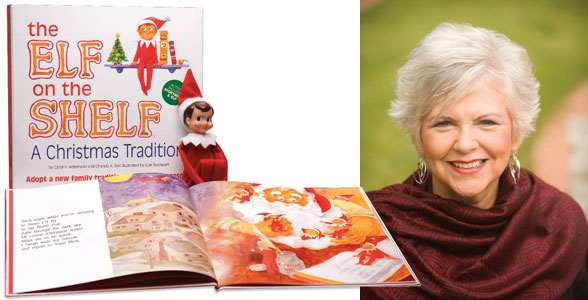By Elizabeth A. Davis
“It’s not Christmas until the elf comes out.”Some children think Carol Aebersold is Mrs. Claus. Her grandson is certain she works for Santa. She refers to her company as “the Southern branch of the North Pole.”
Aebersold (Knoxville ’70) is the author of The Elf on the Shelf: A Christmas Tradition, a book accompanied by an elf doll that started as a cure for empty nest syndrome and has become a wildly successful business operation.
The idea for The Elf on the Shelf came from a tradition her parents started and Aebersold has passed on to her children, her grandchildren, and thousands of other children in the U.S., Canada, and the United Kingdom.
The elf helps Santa know if children are being naughty or nice by watching them at home and relaying the information back to the North Pole. Children name and adopt the elf to give him (or her) the magic to communicate with Santa. Children might find the elf sitting in different places each day, and although they can talk to the elf, the elf cannot speak to them. After Christmas, the elf returns to the North Pole, only to reappear at the child’s house after Thanksgiving to keep watch again.
“At my home, Fisbee appears Thanksgiving night,” she said, referring to her childhood elf. “It’s not Christmas until the elf comes out.”
Aebersold and her twin daughters Chanda Bell and Christa Pitts help run the company Creatively Classic Activities & Books, or CCAB, which they started in Marietta, Georgia, in 2005. They publish The Elf on the Shelf and another book, A Light in the Night, and sell elves and elf accessories. This holiday season they are introducing a DVD that tells the elf story.
More than 10,000 stores carry The Elf on the Shelf, and more than 1.5 million sets of the book and elf have been sold since 2005. The book and its website, www.elfontheshelf.com, have won many awards.
“I thought it would be a success, but I didn’t know it would be this much of a success,” Aebersold said. “Sometimes I can’t believe how blessed I am. I have to see my business card and see my name on there.”
The North Pole by Way of Oak Ridge
Aebersold grew up in Oak Ridge and chose UT Knoxville because she wanted to join the UT Singers after seeing them perform at Oak Ridge High School. And she did. Aebersold, whose maiden name was Varnadore, also was a member of Alpha Xi Delta sorority while majoring in music education. After college, she taught music in high school.
As her children grew—she also has a son named Brandon—Aebersold stayed busy with their school activities and did some freelance editing. When they grew older, she edited some small local newspapers and worked at an advertising and public relations agency.
“I am very involved, and I’m a very easily bored person,” she said. “Empty nest syndrome hit me hard.”
One day her daughter Chanda came up with the idea to write the book when she saw Fisbee, her mother’s elf, on the shelf.
“Mom, you’re a good writer. Why don’t you write a book?” her daughter asked. “We should share our elf tradition with the world.”
Aebersold thought no one would want to read a book like that, but then “I heard that little tiny voice in my head and said OK, and we started writing it,” she said.
They could not find a company to publish the book, so they created the company to publish it themselves. The book launched in September 2005 at a book signing.
“My two daughters and I invited everybody we had ever known,” she said. “It did well, and it began to spread. We were grateful people actually liked it.”
Now it’s a full-time job, and Aebersold spends nearly every day from Thanksgiving to December 23 on the road, promoting the book. The most fun is hearing stories about how the elf story impacts children—even changes their lives.
She received a letter from a woman whose grandchildren were grieving their father, her son, who had died in an accident. “The elf seemed to bring them some joy,” she said.
A teacher told her about a student who had selective mutism, a response to a traumatic event in which someone, usually a child, who is normally capable of speech is unable to speak. In show-and-tell one day, the girl got up and read The Elf on the Shelf in front of the class.
“When I hear stories like that,” she said, “I know I’m doing what I’m supposed to be doing.”



